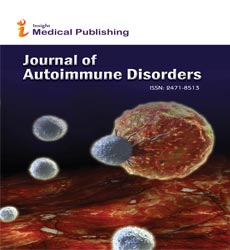Abstract
U0126, an Inhibitor of MEK1/2, Increases Tumor Necrosis Factor-ÃÆà ½Ãâñ-Induced Apoptosis, but not Interleukin-6 Induced Apoptosis in C-28/I2 Human Chondrocytes
Background: Activation of the SAPK/MAPK signaling pathway by pro-inflammatory cytokines is known to induce apoptosis in cultured articular chondrocytes. C-28/I2, an immortalized human juvenile chondrocyte cell line was employed to determine the extent to which recombinant human (rh) forms of the pro-inflammatory cytokines, tumor necrosis factor-α (rhTNF-α,), interleukin-6 (rhIL-6) and oncostatin M (rhOSM) induced apoptosis.
Methods: The induction of apoptosis in the presence or absence of these cytokines was measured by the DAPI/TUNEL assay, by whether or not pro-caspase-3 was activated and by the extent to which poly-ADP-ribose polymerase (PARP) was degraded.
Findings: Only rhTNF-α, and rhIL-6 significantly increased apoptosis in C-28/ I2 chondrocytes, although rhOSM exhibited a strong trend (p=0.067) towards increasing the frequency of apoptotic chondrocytes. The number of apoptotic C28/I2 chondrocytes was significantly increased (p=1.3 × 10-5) by the combination of rhTNF-α and U0126 (10 μM) compared to rhTNF-α alone. However apoptosis was not further increased by combining rhIL-6 with U0126. The LI-COR® western blot system showed that U0126 (10 μM) inhibited the phosphorylation of extracellular signal-regulated kinase-2 (p-ERK2) by phorbol myristate acetatetreated immortalized myometrial cells, U0126 (10 μM) did not alter total U-ERK2. Western blot analysis also revealed that the increased frequency of apoptotic C-28/ I2 chondrocytes induced by rhTNF-α and rhOSM, but not rhIL-6, was associated with PARP degradation. However, none of the cytokines resulted in pro-caspase-3 activation.
Conclusion: These results showed that rhTNF-α and rhIL-6 were strong inducers of apoptosis in the immortalized C-28/I2 human chondrocyte cell line. They also suggested that inhibiting ERK2 phosphorylation via U0126-mediated inhibition of MEK1/2 activity, increased rhTNF-α-induced C-28/I2 chondrocyte apoptosis.
Author(s):
Charles J Malemud, Aaron C Lewis, Meredith A Wylie, Evan C Meszaros, Yelenna Skomorovska-Prokvolit, Sam Mesiano
Abstract | Full-Text | PDF
Share this

Google scholar citation report
Citations : 155
Journal of Autoimmune Disorders received 155 citations as per google scholar report
Abstracted/Indexed in
- Google Scholar
- Open J Gate
- China National Knowledge Infrastructure (CNKI)
- Directory of Research Journal Indexing (DRJI)
- WorldCat
- Geneva Foundation for Medical Education and Research
- Secret Search Engine Labs
Open Access Journals
- Aquaculture & Veterinary Science
- Chemistry & Chemical Sciences
- Clinical Sciences
- Engineering
- General Science
- Genetics & Molecular Biology
- Health Care & Nursing
- Immunology & Microbiology
- Materials Science
- Mathematics & Physics
- Medical Sciences
- Neurology & Psychiatry
- Oncology & Cancer Science
- Pharmaceutical Sciences


